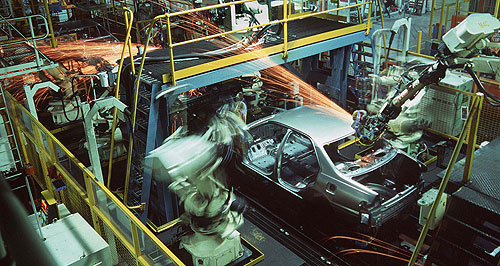Make / Model Search
News - ToyotaFate of Toyota’s Altona plant to be decided in 2014Decision time: Toyota produces the Camry in Victoria at its Altona plant, but will need to cut costs if it plans to make the next-generation version. It’s decision time, with Toyota to determine Altona’s fate during 20144 Dec 2013 By IAN PORTER Toyota Motor Corporation in Japan will decide by next year whether its Australian arm will make the next-generation Camry, and the decision will be influenced by how much progress has been made stripping $3800 out of the cost of producing each car at Altona. The deadline was revealed yesterday at a Productivity Commission (PC) hearing in Melbourne, where Toyota laid down its request for a clear, concise and ongoing policy to support the car industry. The long-time Australian market leader again took aim at what it called unbalanced trade agreements with other countries, which make it harder for local manufacturers to ink crucial export deals. Toyota’s executive director of corporate services Mike Rausa told the PC that other Camry-producing countries were ready to grab extant Australian volume if they could, and that Altona faced strong competition from within Toyota globally to stay in action. “Many other countries are aggressively pursuing this investment (in the next-generation Camry) and they have access to transparent and non-transparent support mechanisms such as direct financial grants, long term import duty exemptions, accelerated depreciation and tariff and non-tariff barriers,” he said. “If we lose our manufacturing now, we will never get it back and we will lose the skill and innovation required to build a car from the ground up.” He said the company had launched a transformation process to cut the cost of making a Camry by $3800 by 2018. The program would focus both on manufacturing and the corporate side of the company. It would also include working with suppliers to improve efficiencies in their plants. The company has launched a $15 million supplier improvement program that would run to 2018. Toyota engineers would be dedicated to this task, he said. “This transformation activity is critical to TMCA securing the next-generation vehicle and export program,” Mr Rausa said. “We are competing against other Toyota plants in both Japan and the US and a decision will be made next year for this model.” Toyota government affairs and trade policy manager Andrew Willis said the transformation process had started last year and there were already runs on the board. He said the quest was helped by a reduction in the value of the Australian dollar. While the program was set to run to 2018, Toyota Australia had to present detailed plans next year, including quotes from suppliers, demonstrating it could achieve the target by 2018. Mr Rausa said Toyota wanted a policy that was ongoing, not one that would be in force for a defined period. He said the policy should clearly demonstrate that Australia wanted to maintain its car industry into the future. “We want to be able to partner with the government to have a policy that shows support for the motor industry in Australia. “That support could vary, and we can discuss the details, but really there needs to be a fundamental desire that (the government) wants an automotive industry in Australia.” He said Australia needed to adopt the determination element from the so-called ‘Toyota Way’, the concept that governs all that Toyota does. “You decide you want something, you make sure you go out and get it. You do what it takes to achieve that. “That’s what we are looking for. A clear, concise consistent policy. It’s not a policy that starts at one point in time and finishes at another point in time.” Apart from the clear, ongoing policy, Toyota requested that the PC recommend that future free-trade agreements (FTAs) address the deficiencies in existing FTAs where possible. This included the FTA being negotiated with the Gulf Co-operation Council, where exported Camrys attract a 5 per cent tariff. The company also said that non-tariff barriers in countries with which Australia has an FTA must also be addressed. The company also wants the automotive industry to be able to claw back tariffs paid on imported parts that cannot be sourced in Australia. This was adding about $300 to the cost of a Camry. After the stoppages during the recent enterprise bargaining round, the company also wants “a more reasonable threshold” on what constitutes “significant harm” during damaging industrial action.  Read more29th of November 2013  Inquiry receives call to nationalise car industryProductivity Commission given many alternatives for car-making’s future7th of November 2013  Toyota ups global profit forecast as Australia strugglesStrong first-half earnings prompt Toyota to see better times ahead23rd of October 2013  ‘Heartening’ talks on Toyota factory futureVictorian premier hears Toyota’s concerns for Altona plant in Japan summit |
Click to shareToyota articlesResearch Toyota Motor industry news |











Facebook Twitter Instagram